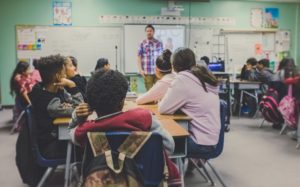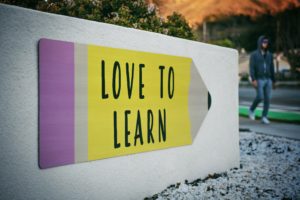How can teachers effectively build relationships by encouraging safe communication and interactions in K-12 online & open learning spaces?
Garrett Dikkers’ (2018) piece outlines different tactics and strategies that educators can utilize to build relationships and encourage safe, social communication in K-12 open learning spaces. She first reveals that the “foundational concept to interactions in online learning” is a community/“social presence” (p.512). Through having connections with others and working towards a common goal together, a learner’s motivation and satisfaction increases (Garrett Dikkers, 2018, p.512). Student motivation has been found to relate to the following: “communication, interaction, and social presence; Intrinsic and extrinsic motivators; and Learner-centered design” (Garrett Dikkers, 2018, p.514). Techniques for fostering communication and social presence such as “using humor, providing opportunities for students to hear the teacher’s voice and share content in their own voices, providing prompt and careful feedback that puts comments into perspective, interacting daily, using real-time communication as much as possible, and structuring assignments that discuss controversial issues and/or require students to communicate or collaborate with their peers” are suggested (Garrett Dikkers, p.514). Other key strategies that teachers can use to engage with their students include:
- designing and organizing learning activities
- facilitating discourse with students, parents, and other teachers
- providing students with one-on-one instruction
- nurturing a safe and caring learning environment
- motivating students to engage in learning activities
- closely monitoring student behavior and learning
(Garrett Dikkers, 2018, p. 514)
These strategies can also be enhanced through community-building efforts such as “real-time web-conferencing tools” that use “chat, voice, webcam, and whiteboard technologies” (Garrett Dikkers, 2018, p. 515).
All in all, I believe that if teachers can cultivate a learning community and environment that is based on friendship, communication, and respect, the social interactions in those spaces will be positive and will help to curate strong relationships.

Photo by NeONBRAND on Unsplash
What did you already know based on the course readings and activities?
After taking some classes that discuss child psychology and prosocial behaviour, I already knew the importance of building relationships in the classroom and how crucial it is to foster a safe and comfortable environment for all learners. I have learned that classrooms must be “learner-centered,” “goal-oriented,” have realistic and universally understood rules and assessment, and activities should typically be seen as “a team effort”; although I learned about these ideas, I never knew they were a part of “human-centered instruction” (Lead SV, 2018). I have also studied some of Vygotsky’s theories and have learned that the “construction of knowledge is social” (Garrett Dikkers, 2018, p.509). Another topic that my courses have touched on is how students learn best when they work in their “zone of proximal development” (Garret Dikkers, 2018, p.509).

Photo by Aleks Dorohovich on Unsplash
What do you know now based on the course readings and activities?
After engaging with the readings, the importance of fostering a peaceful classroom community is cemented in my mind. I have learned that all caring classroom environments (whether they be online or in-classroom) must use precautions and security measures when integrating digital tools and EdTech. Through the UVic Acceptable Use Policy, FIPPA, and Regan & Jesse’s 2019 piece on the ethics of EdTech, my understanding of online “safety” and “privacy” has grown. I have discovered that what leads to the demise of many educational technologies is concerns surrounding “privacy, parental consent and access to the aggregated data” that sometimes includes “sensitive information such as disability status, social security numbers, family relationships, reasons for enrollment changes, and disciplinary actions” (Regan & Jesse, 2019, p. 169). Despite how there are many aspects of EdTech that are possibly problematic from a policy standpoint, they often get grouped into collective “privacy” concerns which can lead to the media and the public not understanding the complexities of EdTech ethics (Regan & Jesse, 2019, p.168-170). The policy documents have taught me that I need to understand and be able to teach my students the following: what constitutes personal information, why privacy and personal information must be consented by every individual (also by their guardians when applicable), where information is stored (USA vs Canada) and what that means, and finally, that these rules are the law that we must follow.

Photo by Tim Mossholder on Unsplash
What do you hope to learn?
I hope to learn ways to cultivate social learning and collaboration for all unique learners. I look forward to exploring digital tools and EdTech that are accessible and meet the needs of all different students.

Photo by Nicole Wolf on Unsplash
References
Freedom of Information and Protection of Privacy Act. Government of BC. Retrieved from https://www.bclaws.ca/civix/document/id/complete/statreg/155_2012#section2
Garrett Dikkers, A. (2018) Social Interaction in K-12 Online Learning. In R. Ferdig & K. Kennedy (Eds.), Handbook of research on K-12 online and blended learning (pp. 509-522 ). Pittsburgh, PA: Carnegie Mellon University ETC Press.
Lead SV. 2018. What is Human Centred Instruction? Retrieved from https://www.leadsv.com/hcn
Regan, P., & Jesse, J. (2019). Ethical challenges of edtech, big data and personalized learning: Twenty-first century student sorting and tracking. Ethics and Information Technology, 21(3), 167-179. DOI: 10.1007/s10676-018-9492-2
University of Victoria. Acceptable Use of Electronic Information Resources Policy. (2018). Retrieved from https://www.uvic.ca/universitysecretary/assets/docs/policies/IM7200_6030_.pdf

alexamclean
Feedback for EDCI 339:
Firstly, I enjoyed the organization of your blog. The review of the article, followed by what you knew and now what you know, felt natural and easy to read. I appreciate all the ways you listed that teachers can cultivate relationships. I did not include much of that and think that it is a hole in my work. One thing that I might add would be about the different types of relationships that Garret Dikkers talked about (Learner-learner interaction, learner-instructor interactions, learner-content interaction) along with some of the research findings that go along with these categories. I think this would be naturally woven into the first paragraph. Maybe you could tie your relationship-building activities to which relationships they are cultivating. The post was detailed and informative, full of both resource knowledge and independent ideas. Great job!
laurenmclean
Feedback for EDCI 339:
I think your blog post showed that you had deep interaction with the resources. You were able to pull quotes that were relevant and added to your analysis of the questions, dive into the content of each article, and display your prior-knowledge in a clear way. I enjoyed how you discussed teaching your students about online privacy and safety issues as this is a key idea to impart into 21st century students and how you structured your blog post into clear questions to be answered. A few points of consideration could be the length (I know you have said you struggle to keep within the word limit but just deciding what is truly necessary) and the heading about your prior knowledge is not worded correctly “What did you already know based on the course readings and activities?” should instead be “What did you already know prior to the course readings and activities?”.
hgus123
I feel that your blog post does a fabulous job of integrating many of the course readings that we reviewed over the past week! I think you do a great job of defining the factors that influence relationships as well as including strategies for success in an online learning environment. One thing that you may want to consider is your use of bolding words. I do like that you have chosen to do that but as a reader, it can be a bit overwhelming if too many words are popping off the page. Furthermore, I really enjoyed reading your take-aways from the readings and how you have grown a stronger awareness of the use/storage of personal information. One other way you could possibly improve this blog is by going through and editing a few of the sentences so it is not too wordy (check the third sentence in the first paragraph). This was a pleasure to read and I felt it perfectly summarized the key points from this week’s topic!